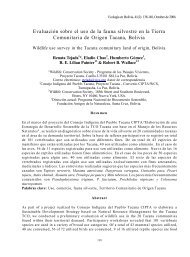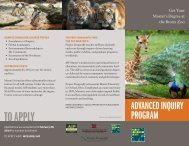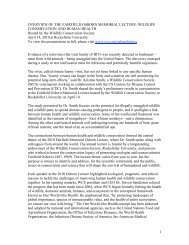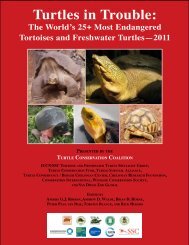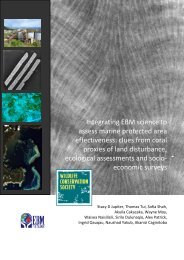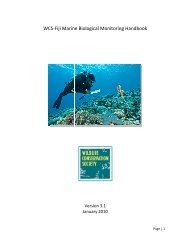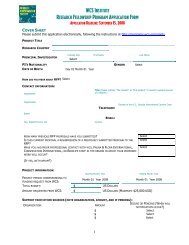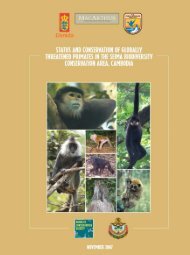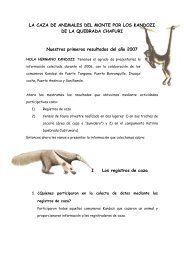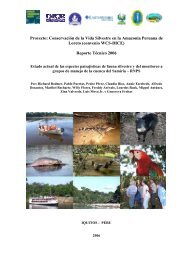WCS Annual Report 2012 - Wildlife Conservation Society
WCS Annual Report 2012 - Wildlife Conservation Society
WCS Annual Report 2012 - Wildlife Conservation Society
Create successful ePaper yourself
Turn your PDF publications into a flip-book with our unique Google optimized e-Paper software.
April) corresponds to a period of low food availability.<br />
Wolverines have adapted by amassing<br />
food caches during the preceding months when<br />
food is more readily available.<br />
Understanding why and how wolverines exist<br />
where they do and the various adaptations they<br />
have evolved to survive will better inform population<br />
management and conservation strategies.<br />
A previous 2010 study suggested that wolverines<br />
must have deep snow available in springtime<br />
so that they can give birth to their small cubs<br />
in a warm, secure den. The new report showed<br />
that other factors such as competition for food<br />
may also be involved in explaining the limits to<br />
wolverine distribution.<br />
The cold storage plan reduces the energy spent<br />
by females searching for food while in lactation<br />
phase, cutting the time spent away from their<br />
cubs. Wolverine reproduction appears to be<br />
confined to a brief period of the year, and the<br />
lactation phase in females (February through<br />
Documenting Madidi’s Natural<br />
Treasures<br />
From snow-capped peaks to lowland tropical<br />
forests, Bolivia’s Madidi National Park inspires<br />
awe. The 7,335-square mile reserve, a portion<br />
of the larger Madidi-Tambopata Landscape shared<br />
with Peru, lures tourists with its natural beauty,<br />
but scientists come to the park for different<br />
reasons. For years, they’ve sought to document<br />
the terrain’s prolific plant and wildlife. With<br />
help from <strong>WCS</strong>, the Bolivian Park Service this<br />
year released a new compendium suggesting<br />
that Madidi National Park might be the most<br />
biodiverse region in the world.<br />
Even though scientists have surveyed only<br />
one third of the park, their findings so far<br />
amaze: more than 1,868 vertebrates, including<br />
200 species of mammals and nearly 300 types<br />
of fish; and 12,000 plant varieties. With an<br />
estimated 1,088 bird species, Madidi is thought<br />
to possess 11 percent of the globe’s avian diversity.<br />
Only eleven countries contain more avian<br />
species (the entire United States boasts fewer<br />
than 900 bird species). Madidi’s mammals<br />
range from the lowland tapir—an Amazonian<br />
herbivore weighing up to 660 pounds—to the<br />
25<br />
wcs story<br />
/<br />
achievements DEBUTS & ANNOUNCEMENTS<br />
• <strong>WCS</strong> launches a video<br />
produced to train military personnel<br />
on the consequences<br />
of purchasing illegal wildlife<br />
products while stationed<br />
overseas.<br />
• The world’s largest known<br />
crocodile—Crocodylus thorbjarnarsoni,<br />
now extinct—is<br />
named in honor of Dr. John<br />
Thorbjarnarson, the <strong>WCS</strong><br />
conservationist and preeminent<br />
crocodilian expert<br />
who succumbed to malaria<br />
in 2010.<br />
• Oscar Loayza of <strong>WCS</strong>’s Madidi<br />
Program in Bolivia receives<br />
the Kenton Miller Award for<br />
Innovation in Protected Areas<br />
Management.<br />
• <strong>WCS</strong> Executive Vice President<br />
for <strong>Conservation</strong> and Science<br />
John Robinson is elected as<br />
a regional councillor for North<br />
America and the Caribbean for<br />
the International Union for the<br />
<strong>Conservation</strong> of Nature (IUCN).<br />
• <strong>WCS</strong> Executive Vice President<br />
and Zoos & Aquarium General<br />
Director Jim Breheny is<br />
named onto the Board of<br />
Directors of the Association<br />
of Zoos & Aquariums (AZA).<br />
• <strong>WCS</strong> Chief Veterinarian and<br />
Director of Zoological Health<br />
Paul Calle is named president<br />
of the American Association<br />
of Zoo Veterinarians (AAZV)<br />
Executive Committee.



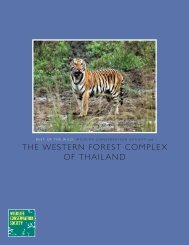
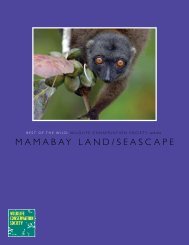
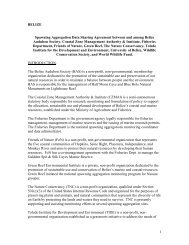
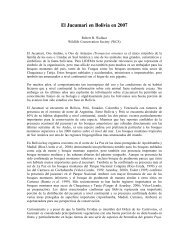
![RaLand / SeaScape [PDF] - Wildlife Conservation Society](https://img.yumpu.com/49974326/1/190x245/raland-seascape-pdf-wildlife-conservation-society.jpg?quality=85)
